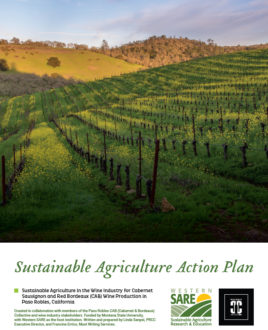The Sustainable Agriculture Action Plan for Cabernet Sauvignon and red Bordeaux (CAB) Wine Production in Paso Robles is a document developed by the Paso Robles CAB Collective winegrape growers, winemakers, marketers, proprietors, and other wine industry stakeholders under a pilot grant program by Western SARE.
The plan addresses the specific needs of the Paso Robles CAB winegrape growing and wine production industries so they can adapt to the challenges presented by climate change, sustain their economic benefit to the local community, improve sustainability models, and continue to produce world-class quality wines.
This Sustainable Agriculture Action Plan is intended to assist all sectors of the wine industry in understanding the barriers to implementing sustainable practices across the vineyard, winery, distribution, and marketing sectors and serves as a roadmap to develop future strategies by identifying key priorities for research, regulations, education, and innovation for Paso Robles CAB winegrape growers and producers and the wider wine industry.
The needs and priorities identified by Paso Robles CAB winegrape growers and producers are specific to their unique climate change challenges, terroir, and sustainability practices. It takes an expansive and holistic view of both the wine industry and the geographical region of the Paso Robles AVA. The plan highlights the complexity of sustainable agriculture due to individual farming conditions, the diversity of the AVA, and the various sectors of practice within wine production (winegrape growing, wine making, wine marketing, wine distribution); all of which have diverse and varied needs. Exploring sustainable issues from the Paso Robles CAB producer’s perspective serves as a snapshot of many of the issues faced by the wider wine industry relating to sustainable agriculture and exposes some unique concerns and barriers. It highlights important research and education opportunities specific to CAB production in Paso Robles and can be used for the broader wine industry to help evolve sustainable agriculture and climate-smart practices necessary in these ever-changing times and period of uncertainty
This material is based upon work that is supported by the National Institute of Food and Agriculture, U.S. Department of Agriculture through the Sustainable Agriculture Research and Education (SARE) program. Any opinions, findings, conclusions, or recommendations expressed in this publication are those of the author(s) and should not be construed to represent any official USDA or U.S. Government determination or policy.
